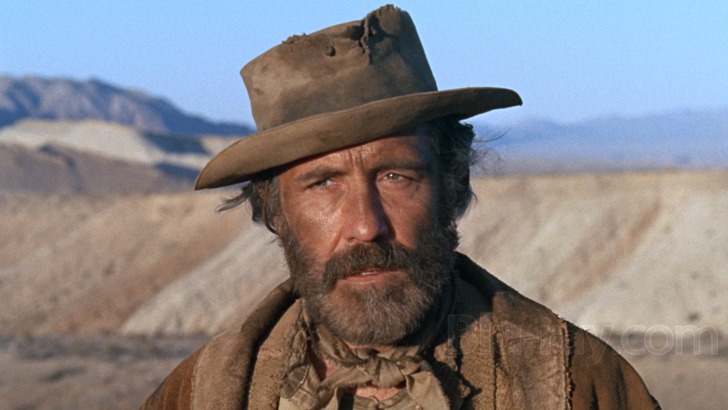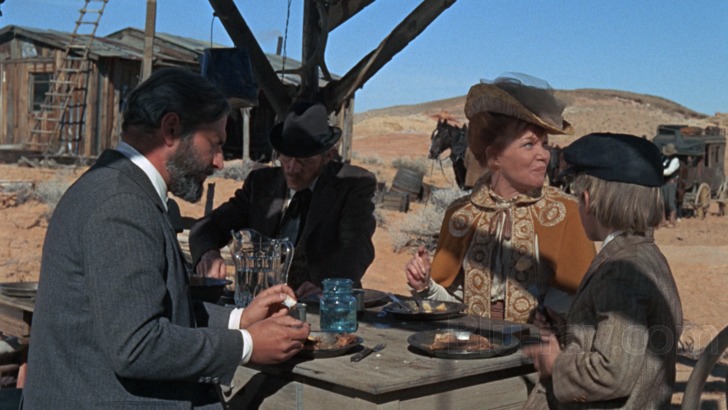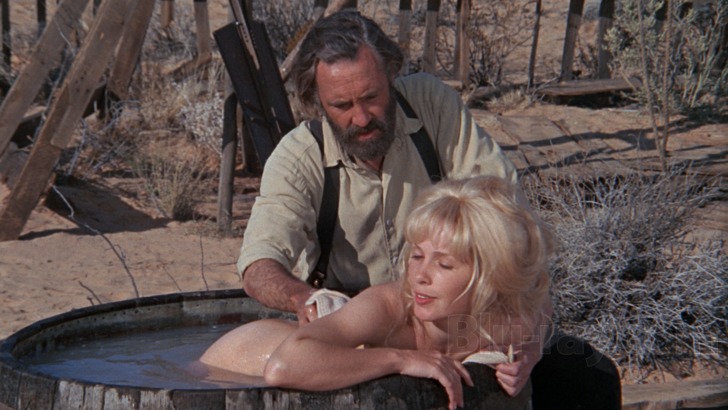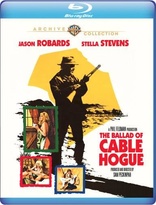The Ballad of Cable Hogue Blu-ray Movie
HomeThe Ballad of Cable Hogue Blu-ray Movie 
Warner Archive CollectionWarner Bros. | 1970 | 121 min | Rated R | Jun 06, 2017
Movie rating
7.4 | / 10 |
Blu-ray rating
| Users | 4.0 | |
| Reviewer | 4.0 | |
| Overall | 4.0 |
Overview
The Ballad of Cable Hogue (1970)
Double-crossed and left without water in the desert, Cable Hogue is saved when he finds a spring. It is in just the right spot for a much needed rest stop on the local stagecoach line, and Hogue uses this to his advantage. He builds a way station for stagecoach passengers and prospers -- until the modern age appears on the horizon.
Starring: Jason Robards, Stella Stevens, David Warner, Strother Martin, Slim PickensDirector: Sam Peckinpah
| Western | Uncertain |
| Drama | Uncertain |
| Comedy | Uncertain |
| Romance | Uncertain |
Specifications
Video
Video codec: MPEG-4 AVC
Video resolution: 1080p
Aspect ratio: 1.78:1
Original aspect ratio: 1.85:1
Audio
English: DTS-HD Master Audio 2.0 Mono (48kHz, 24-bit)
Subtitles
English SDH
Discs
Blu-ray Disc
Single disc (1 BD)
Playback
Region free
Review
Rating summary
| Movie | 4.0 | |
| Video | 4.5 | |
| Audio | 4.5 | |
| Extras | 3.0 | |
| Overall | 4.0 |
The Ballad of Cable Hogue Blu-ray Movie Review
Lucky Loser
Reviewed by Michael Reuben June 9, 2017No one knew what to make of Sam Peckinpah's The Ballad of Cable Hogue when it appeared in
1970, just one year following the director's blood-soaked ballet of Western violence, The Wild
Bunch. After suffering through Peckinpah's notoriously combative temper and his extensive cost
overruns, the executives at Warner Brothers were handed a shambling character study that they
didn't know how to market. Dumped into a handful of theaters with minimal publicity, Cable
Hogue quickly disappeared. As co-star Stella Stevens later remarked, "Warner Brothers didn't
release it; they flushed it."
Since that initial disappointment, Cable Hogue has emerged as one of Peckinpah's signature
achievements, but it remains a challenging film for a variety of reasons, not the least of which is
that it doesn't fit neatly into a familiar genre. It's a Western without any of the usual earmarks,
with a hero who isn't fast on the draw, tough with his fists or noble under a rough exterior. (His
skills on horseback aren't worth much either.) It's a comedy where the laughs are often tinged
with sorrow and regret. For several extended stretches, it turns into a musical—and then turns
back again. And Cable Hogue routinely mocks Christian worship while just as routinely
invoking biblical imagery to suggest a fall from grace. Brimming with contrary ideas, themes and
moods, Cable Hogue provides a little of everything, with the notable omission of the adrenaline
rush of violence for which The Wild Bunch had made Peckinpah famous. Yes, there are a few
deaths, but the body count is one of the lowest in the history of Westerns.
The Ballad of Cable Hogue joins Ride the High Country in the Warner Archive Collection's
roster of Peckinpah films on Blu-ray. With these two releases and the upcoming Kino edition of
Junior Bonner, Peckinpah's major work is now
almost fully represented on Blu, with the notable
exception of Pat Garrett and Billy the Kid, for which
we can only hope that the wait will be worth it.

Cable Hogue is one of those episodic tales that follow a central character through diverse adventures and encounters, like Huckleberry Finn or Don Quixote. The literary term for this genre is "picaresque", but picaresque stories usually involve a traveling hero whose path leads to adventure. In Cable Hogue, by contrast, the titular hero stays largely in one place, with most of his traveling done by the time the opening credits conclude, except for an occasional visit to the nearest town.
In the arid wasteland between two Western outposts with the colorful names of Lizard and Dead Dog, Cable Hogue (Jason Robards) is fruitlessly searching for water with two partners, Bowen and Taggart (Wild Bunch veterans Strother Martin and L.Q. Jones). When their own water supply runs low, Bowen and Taggart decide to take what remains for themselves and abandon Cable in the desert. As the grizzled cowboy drags himself toward civilization on foot, he pleads with the Almighty to send him water and promises to mend his ways. Four days later, Cable's prayers are answered when he literally stumbles into the only underground spring for miles. Now that he's been rescued, Cable immediately forgets about the Lord, claims full credit for the discovery and sets about building "Cable Springs", a rest stop for weary travelers and parched stagecoach horses on the trail between Lizard and Dead Dog. A classic entrepreneur, Cable sells water at ten cents for people, twenty-five for livestock. Eventually, there are also meals for sale, as long as you like "prairie stew" and don't ask what's in it.
Revenge on the partners who left him to die is never far from Cable's mind, but he's content to bide his time until they cross his path again, which doesn't happen until late in the film (with unexpected results). Meanwhile, Cable interacts with various people who pass through Cable Springs or whom he encounters in town. Chief among them is Rev. Joshua Sloan (David Warner, Time After Time), an itinerant preacher who is Cable's first customer (well, his first paying customer) and who stays at Cable Springs long enough to help its owner build the first rickety structures. Rev. Joshua may be a self-proclaimed man of God, but he's also an confirmed scoundrel with a swindler's patter and a wandering eye, especially for married women. At heart, he's as much an independent as Cable Hogue, which is probably why they get along so well, despite moments of friction and the occasional drawn gun.
Cable's other major relationship is with Dead Dog's town prostitute, Hildy (Stella Stevens), who is so strikingly beautiful that she stops the weary prospector in his tracks when he first passes her in the street. Their courtship (if you can call it that) is a comedy of errors and mutual bathing, but when Hildy is run out of town, she seeks refuge at Cable Springs, where she is welcomed with open arms. In her own way, Hildy too is an entrepreneur, with dreams of relocating to San Francisco and striking it rich, preferably by marrying a wealthy husband. But Hildy hadn't planned on meeting someone who touches her heart as Cable Hogue does, and for a while, the film becomes a romantic comedy, complete with a light-hearted duet ("Butterfly Mornin's") sung by the two lovers.
Cable Hogue was scripted by two actors, John Crawford and Edmund Penney, who, like many actors-turned-writers, display a flair for original characters and interesting dialogue but fall short on narrative structure and plot mechanics. Peckinpah remedied the script's deficiencies with a deft array of directorial tricks, alternately speeding up the pace to maintain momentum and pausing for key events or expressions of deep emotion. He employs split screen, periodic undercranking and sophisticated editing that compresses events separated in time into one continuous scene linked by connecting dialogue. His eye for casting remained impeccable, from Jason Robards' star turn as the unrepentant rascal of the title, to Stella Stevens' unique mix of child-like openness and cynical calculation as Hildy, to smaller roles like the shrewd banker (Peter Whitney) who funds Cable's startup operation.
Like many picaresque tales, Cable Hogue doesn't build to a grand climax, but it does reach a definite conclusion. In the film's final act, scores are settled, friends reunite, lost love is found again, and the modern age appears on the horizon in the form of automobiles on the trail between Lizard and Dead Dog. Instinctively, Cable knows that vehicles which don't need horses signal the beginning of the end for his business enterprise, and he makes plans to leave Cable Springs behind, but not before embarking on one last adventure.
The Ballad of Cable Hogue Blu-ray Movie, Video Quality 

Lucian Ballard, the cinematographer of The Wild
Bunch, reteamed with Peckinpah for The Ballad of Cable Hogue. (They would later collaborate on Junior Bonner and The Getaway.) Ballard's artful lighting is discussed in the disc commentary, particularly his skill in using "day
for night" at a time when film stocks and lenses weren't yet fast enough to shoot night scenes in
actual night.
For this 1080p, AVC-encoded Blu-ray, the Warner Archive Collection commissioned a new
scan, which was performed by Warner's Motion Picture Imaging facility at 2K using a recently
struck interpositive. An original 1970 dye transfer (IB) Technicolor answer print was used for
color reference; although the answer print itself was battered, Technicolor's dye transfer process is noted
for its resistance to fading. The Blu-ray image reflects the care with which MPI has managed the
film's many dissolves and superimpositions, which were accomplished optically with the
concomitant loss of detail and sharpness and accentuated grain. Cable Hogue's opticals blend
smoothly into the flow of the film, never standing out as qualitatively distinct. It helps that
Ballard's photography has a soft, film-like texture that doesn't sacrifice image detail. Cable's
weather-beaten attire (which is replaced by finery, as he prospers), Hildy's playfully come-hither
outfits, and Rev. Joshua's dusty black uniform are all reproduced in detail, along with the
copious sand of Cable Springs and the hardy creatures who inhabit it (mostly rattlesnakes and
lizards), and the gradually improving structures of Cable's desert establishment. The film's palette is consistently dusty and faded, except for a few
eruptions of richly saturated color, mostly near the end. The grain pattern is natural and finely rendered. WAC has mastered Cable Hogue
at its usual high bitrate,
here 34.99 Mbps.
The Ballad of Cable Hogue Blu-ray Movie, Audio Quality 

Cable Hogue's mono track has been taken from the original magnetic master, subjected to light clean-up intended to minimize hiss without compromising the soundtrack's high end, and encoded on Blu-ray in lossless DTS-HD MA 2.0. It's an effective presentation that ably reproduces Peckinpah's careful sound editing, which contrasts the wild natural surroundings of Cable Springs and its desert winds, dangerous rattlesnakes and howling coyotes, with the clatter and bustle of Dead Dog, which boasts both a lively saloon and a well-attended revivalist tent with a hellfire-and-damnation preacher. Dialogue is clearly rendered, and the light-hearted, often comical score by the late Jerry Goldsmith (whose credits are too numerous to mention) is presented with fidelity and dynamic range consistent with the source. Goldsmith and actor Richard Gillis collaborated on the film's songs, and Gillis performed the numbers that play over the opening and closing titles, as well as several others that occur during the film. Jason Robards and Stella Stevens did their own singing on "Butterfly Mornin's".
The Ballad of Cable Hogue Blu-ray Movie, Special Features and Extras 

The extras have been ported over from Warner's 2006 DVD of The Ballad of Cable Hogue,
except for the trailer gallery of additional Peckinpah films. Cable Hogue's trailer is included,
remastered in 1080p.
- Commentary by Nick Redman, Paul Seydor, Garner Simmons and David Weddle: This commentary reassembles the panel of Peckinpah scholars who provided erudite discussion for Ride the High Country. The panel points out details of theme, performance and editing and relates yet more stories from Peckinpah's life, but this commentary is somewhat is less of a spoken treatise than that on RtHC. It's more of an extended appreciation of a film that, as several of the commentators readily acknowledge, is far from perfect but still exercises a unique fascination, especially for fans of the director's other work.
- The Ladiest Damn'd Lady: An Afternoon with Actress Stella Stevens (480i; 1.85:1; 27:00): Directed by Nick Redman, this original short was produced expressly for Warner Home Video. In an engaging and lively interview, Stevens reflects on her lengthy career and shares detailed recollections of making Cable Hogue. She is unsparingly frank in her description of Peckinpah's consistently poor behavior and equally effusive in her praise of her leading man, Jason Robards.
- Theatrical Trailer (1080p; 1.78:1; 2:58): Listening to the deadly serious tone of the voiceover narration, you can't help but wonder whether the PR department understood that they were promoting a comedic love story: "This is the pioneer, this is the man whose faith, stamina and risked capital conquered the frontier and carved the Wild West into a nation!"
The Ballad of Cable Hogue Blu-ray Movie, Overall Score and Recommendation 

Peckinpah's Westerns, even the violent ones, are steeped in nostalgia, which came to the filmmaker as a kind of
ancestral legacy. The director's forebears included ranchers and loggers whose exploits in the
Wild West had become the stuff of family legend, and several locations in the High Sierras
(where Ride the High Country is set) bear the name "Peckinpah". Cable Hogue stands apart from
Peckinpah's other Westerns for its stubborn refusal to mythologize its hero, even as he routinely
demonstrates a resourceful stamina and native cunning that make him a born survivor. As Rev.
Joshua says, "do not take him lightly". The same can be said of WAC's Blu-ray presentation of
this unusual film, which is highly recommended.
Similar titles
Similar titles you might also like

Cimarron
Warner Archive Collection
1960

Rawhide
Desperate Siege
1951

Duel in the Sun
Roadshow Edition
1946

Broken Lance
Limited Edition to 3000
1954

The Ballad of Little Jo
1993

My Darling Clementine
Theatrical and Prerelease Versions
1946

Greaser's Palace
1972

The Big Trail
1930

Hang 'Em High
50th Anniversary Edition | Shout Select #57
1968

Valdez Is Coming
1971

Sweetwater
Sweet Vengeance
2013

Warlock
Limited Edition to 3000
1959

Last Train from Gun Hill
Paramount Presents #18
1959

Will Penny
1968

Jeremiah Johnson
Warner Archive Collection
1972

Something Big
1971

Ride the High Country
Warner Archive Collection
1962

Unforgiven 4K
1992

Ride Lonesome
1959

The Duel
2016
